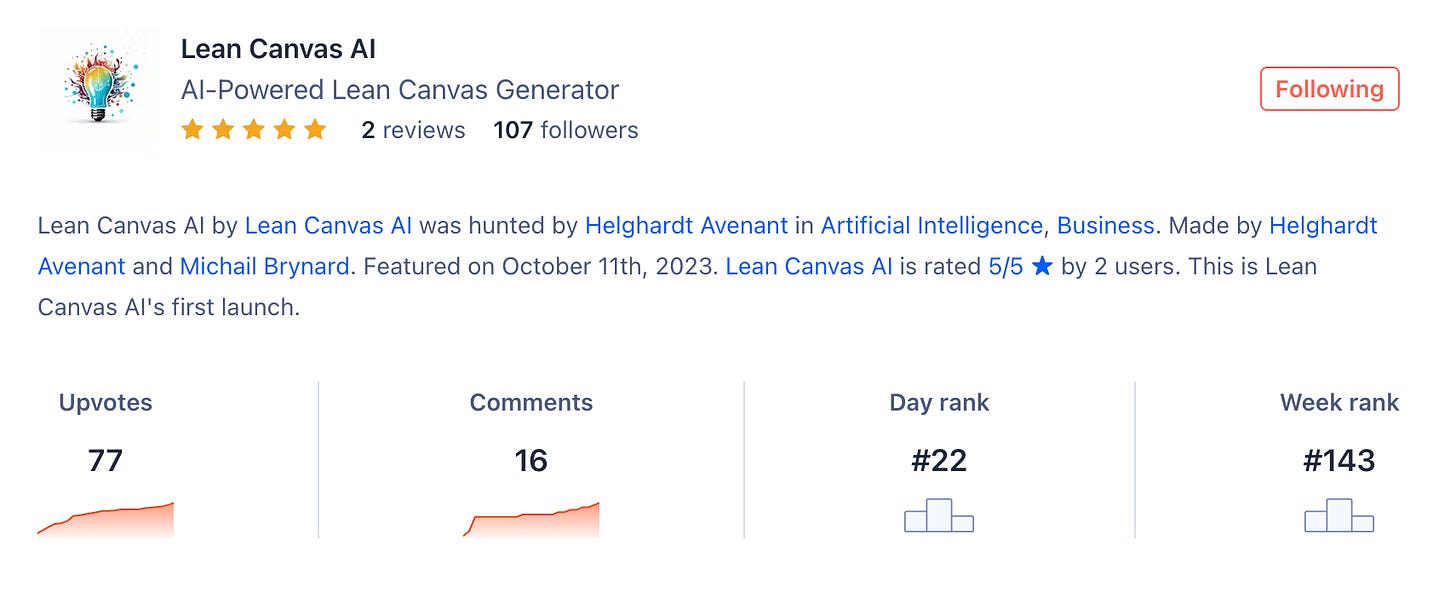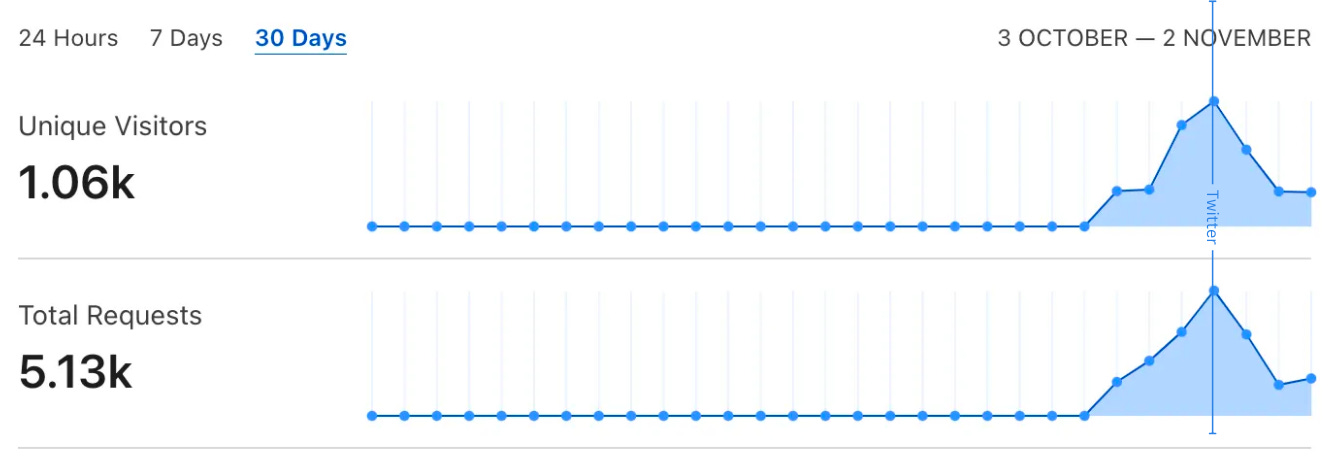3 Mini-AI Apps Launched In 16 Days
Exploring the Why, What and How: Key Metrics, Lessons And Next Steps Building AI Apps
In early October, I challenged myself to spend two weeks building and launching mini-AI wrapper apps. I had a shortlist of 7 ideas and managed to complete 3 MVPs:
💡 Lean Canvas AI - AI-powered Lean Canvas generator helping founders visualize their ideas on 1 page.
🤖 Office Hours AI - AI-powered office hours sessions to help founders think through critical questions.
📊 Get Feedback AI - AI-powered dynamic survey generator to gather product feedback from your customers.
I set a 4-hour limit on active development and another 4-hour limit doing other things like planning the project, writing the content, launching on ProductHunt, social posts, DM’ing friends, etc.
I optimized for speed and not for quality. Building with time constraints helped me stay focused on one feature at a time and not get too obsessed and attached to the project.
Below, I share my process, early metrics, why I built it, how I did it, lessons, and the next steps.
Interested to see more demos? Follow me on Twitter or LinkedIn.
What is my process?
None of this would have been possible (for me) to do in this timeframe without leveraging AI to do most of the grunt coding. I used my existing development setup to make it easy to do deployment, hosting, custom domain config, etc.
I do take a lot of shortcuts, for example, hosting the apps on the same instance, ignoring some validation/error handling, no emailing, and no authentication. Although I know how to add these, I find it adds another 2 to 3 hours to the development turnaround time.
To keep my efforts focused, I followed a step-by-step process that I defined upfront:
Preparation [1 hour]
Design minimum wireframe using Figma. Knowing I don’t have much time, I keep it very simple.
Test the idea manually in ChatGPT to get a feel for the prompt.
Use AI code generation script to create the initial code from an idea input. “See how I built it” below.
Key feature development [2 hours]
Clean up the codebase and add key features. For each project, there was at least one thing that took a bit of extra effort, but I was able to use ChatGPT directly to help out. For example, for Lean Canvas AI, I had to create a custom CSS grid system for the canvas layout; for Office Hours AI, I needed to create a chat-like interface; and for Get Feedback AI, I developed an extra prompt layer to keep the questioning relevant and exciting.
Clean up and testing [1 hour]
Clean up the user interface. I try to make the UI clean, consistent, and mobile responsive. Again, ChatGPT helps a lot when I can ask to add code that makes the component responsive for mobile.
Testing and iterations.
Deploy and final touches [1 hour]
Deploy the app to Heroku. I have a well-documented process to do this in a couple of minutes.
Configure the domain using Cloudflare.
Live testing and fixing.
Prepare launch content [2 hours]
ProductHunt video, content, screenshots and launch. I kept it simple with a screen share demo recording using Loom and screenshots.
LinkedIn & Twitter posts.
Manually share on socials [1 hour]
Send DMs on socials to target customers. I typically share with 25 friends or followers that I think would find the product relevant.
Key metrics and how it is going
I finished 3 MVPs and launched two on ProductHunt. None of the products took off significantly, but I believe the feedback and insights are valuable to work from.
⌚️ Time [3 projects]: 24 hours spread over two weeks
📊 Total site visits [3 projects]: 7,250
❤️ Total upvotes [2 projects]: 118
🧑🤝🧑 Unique users [3 projects]: ±500
💸 Cost: $25-$50/month
🤑 Revenue: $0
Lean Canvas AI
Lean Canvas AI seems to be the best-performing project so far. Over 750 canvases have been generated since the launch. Users are asking for a way to save their canvases, edit them, download them, interact with the canvas, and do live web searching.


Sadly, I got no engagement on Hackernews, but the traffic from Hackernews was noticeable. The purple line below indicates the traffic from the ProductHunt launch, and the orange line represents the Hackernews post the next day.
Office Hours AI
The app requires at least ten responses to generate a report. Naturally not everyone gets that far. About ten office hours reports have been generated so far. I have one very excited user who asked to get weekly reminders to do the exercise again.


For this app I launched it on Hackernews first. The orange line below indicates the traffic from the Hackernews post, and the purple line is the traffic from the ProductHunt launch.
Get Feedback AI
I delayed the ProductHunt launch for this project to first get feedback from direct contacts. In the meantime, I posted it on Twitter to test the initial response.
About ten feedback surveys have been created, with 20+ end users engaging in a survey. Users say it is unclear when the survey will end, and they want to define critical initial questions, let users skip questions, and select qualitative/quantitative style surveys. They also want a way to get summarized insights from all the surveys that have been completed.
Why build mini-AI wrapper apps
I had four reasons for going down the path of building wrappers.
Can AI start a startup - Firstly, I am very interested in the role of AI in starting and running startups, hence also starting the newsletter. I am trying to go deeper into what tools the AI needs to do so by building tools for startup founders.
Build something I want - As a founder, I use ChatGPT daily for simple things like asking it to generate a Lean Canvas for a new idea, book recommendations, creating a persona, generating a survey, helping with a blog title, etc. In most cases, the UI is limited in some way, which opens the opportunity for AI wrapper apps.
Engage with target customers - Michail and I are interested in building products for startup founders, mainly helping with startup idea validation. The big idea is: what if AI can start startups? Starting much smaller, we created LampBuilder to spin up landing pages with built-in waitlists and metrics. We realized there might be an opportunity earlier in the funnel, starting with creativity and brainstorming. We noticed some LampBuilder users using it for visualizing their ideas quickly and not necessarily for launching a site. Building mini-apps helped us test interests in startup ideation tools.
Drive traffic to LampBuilder - We hoped the mini-AI apps would help us generate traffic to LampBuilder, especially knowing that we can launch the apps on ProductHunt, Hackernews, Indiehackers, and social media. We added a button in the navigation to redirect to Lampbuilder. In the last 30 days, the mini-apps have contributed a total of 287 referrer visitors, which brings it second on the list of top referrers.
Have fun and learn new tricks - It is very satisfying to build these apps, given the quick turnaround time and being able to get something in front of users. AI makes it possible to create single-feature applications that feel like magic that would not have been possible otherwise.
How I built it
I am using a stack I am very familiar with: Django (Python) + Heroku + PostgreSQL + Redis + Cloudflare + OpenAI + Namecheap.
In the video below, I show my AI development flow for an example idea, Tinder for Movies.
If you want to buy an AI Wrapper Django Course using my development stack, please join the waitlist here.
How much is it costing
At the moment, we have not yet switched on any monetization, but we are looking to do so soon. Below is a quick breakdown of the cost per month.
Hosting - Currently, my Heruko instance is on the basic tier, with usage costs of around $20/month.
Domains - I decided to purchase unique parts per project. This is probably unnecessary, but it makes it easier to post on ProductHunt and Hackernews if it is a fresh domain.
Services - I am also subscribed to Open AI Premium, which costs $25/month.
OpenAI - We received $2,500 in free OpenAI credits at the Angelist AI Hackathon earlier this year. Using GPT 3.5, the credits go a long way. Currently, our OpenAI costs across the various projects are less than $20/month in credits.
Incorporation - Angelist gave us free Stripe Atlas credits to incorporate a new entity. This included free credits for AWS, Google Cloud, Digital Ocean, etc.
Assuming I run out of free credits, my monthly cost would be just under $50/month, excluding custom domain name purchases.
Key lessons and insights
AI prompting - In my development process, I am doing trial and error to get the prompt to work well for the various use cases. A system that can generate prompts, score the results, and help you refine best-fit prompts would be interesting.
Customers - Most early users are trying it out of curiosity. Many of the product descriptions are not relevant to what they are working on. For each project, I did get at least one user who was enthusiastic and sincere in their testing. My gut feeling is to prioritize their feedback.
Marketing tactics - Mini apps are an effective way to drive traffic to your primary project, as we have seen with LampBuilder.
Value thesis - What is surprising is how off-base my predictions have been on which app would perform the best. My gut feeling was that Hackernews would be very excited about Office Hours AI, but that was inaccurate.
Hackernews - Even though you don’t get engagement on Hackernews, it seems to generate some traffic to your site.
Feedback - I think having a feedback opportunity built into the experience will be beneficial, hence Get Feedback AI.
What about the hard questions
My founder friends have challenged me to think about these questions.
Aren’t AI wrappers lame and not defensible?
I agree that not everything needs an app or AI. Sometimes, sheets, docs, or ChatGPT directly will do just fine. That being said, wrappers present a strong enough value proposition for use cases where you need visual effects, opinionated guidance, summarized logs, interaction with end users, etc. On defensibility, I hope that focus, persistence, and heart result in better customer products, but I don’t know yet.
If it works, won’t it be easy to copy?
Yes, I think it would be straightforward to copy regarding functionality. I hope branding and loyalty are more challenging to kill if it catches momentum.
Aren’t startup founders demanding target customers?
I think startup founders are complex customers to work with in general, especially pre-product market fit startups. However, every market has its challenges. The benefit of building for founders is that they typically represent early adopters and are willing to try new things, even if it sucks.
The trick will be ensuring the product stays relevant throughout the startup’s life cycle. At the moment, we decided to target pre-product market fit founders because we are interested in seeing whether AI can give founders an edge or eventually do it better.
How will you monetize it?
I assume that we can charge subscription fees for the following particular value adds, but we are still figuring it out. We’ll experiment with the classic SaaS tactics: better models, extra prompts, special features, extra seats, etc.
What is next
First, I want to add Get Feedback AI to the two projects.
Secondly, I want to add a basic monetization layer to the apps. The goal will be to test interest in advanced features with a “buy” button that collects the customer’s email address as a start.
I plan to launch two more mini-apps over the next two weeks. I want to try something more mainstream, like a startup book recommending app or a mental model assistant.
In between, I want to loop back to make the apps a bit more rounded by adding some validation, tweaking the prompts, adding login, explaining a bit better how it works, and making it easy to get feedback.
I am thinking about bringing the tools together in one product suite if more users ask for it. Please let me know what you think in the comments.
I am also considering launching a mini-course to create AI Wrappers Using Django. Please join the waitlist if you are interested.
Please email me (helghardt at lampbuilder dot com) or DM me on Twitter @Helghardt if you want to chat.
Let’s keep building
Helghardt









